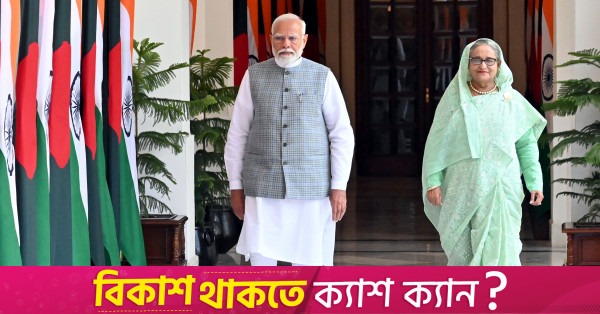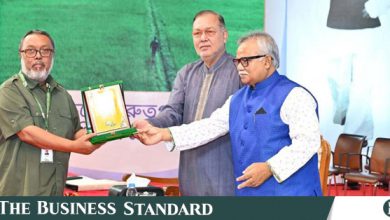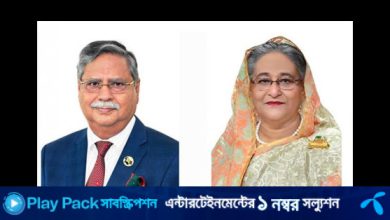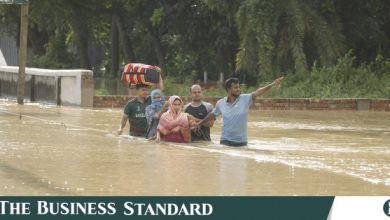Hasina and Modi agree on CEPA negotiations, regional integration


7 new MoUs signed, 3 old ones renewed
Prime Minister Sheikh Hasina was welcomed by her Indian counterpart Narendra Modi at the Hyderabad House in New Delhi as she reached there for a meeting on bilateral issues. Photo: PMO
“>
Prime Minister Sheikh Hasina was welcomed by her Indian counterpart Narendra Modi at the Hyderabad House in New Delhi as she reached there for a meeting on bilateral issues. Photo: PMO
Dhaka and Delhi have agreed to boost trade and investment ties by initiating negotiations for a Comprehensive Economic Partnership Agreement (CEPA), operationalising two Special Economic Zones, enhancing connectivity and trade infrastructure, and energy cooperation.
These decisions were made during a summit meeting between the prime ministers of Bangladesh and India in Delhi on Saturday. Bangladesh Prime Minister’s visit marked the first high-level meeting since Narendra Modi was sworn in for the third consecutive term as India’s prime minister earlier this month.
TBS Illustration
“>
TBS Illustration
On water resource management, both countries committed to data exchange and the formulation of an interim water-sharing framework. They welcomed the formation of a Joint Technical Committee to renew the 1996 Ganges Water Sharing Treaty and agreed to manage the Teesta River with Indian assistance.
The leaders also emphasised strengthening defence cooperation, exploring defence industrial collaboration for the modernisation of the Bangladesh Armed Forces, and continuing multifaceted military engagements.
TBS Illustration
“>
TBS Illustration
Also, the two countries reiterated their commitment to a free, open, and rules-based Indo-Pacific region. They will co-lead the Disaster Risk Reduction and Management pillar of the Indo-Pacific Oceans Initiative (IPOI).
Besides, they aim to make their partnership a key anchor for regional integration under BIMSTEC, SAARC, and IORA, working together on global platforms to promote common interests, particularly those of the Global South.
After the meeting, the Bangladesh prime minister along with her Indian counterpart witnessed the signing of 10 MoUs on the key areas of blue economy and maritime cooperation, railway, capacity building, health, academic cooperation, fisheries and disaster management.
Following the agreement signings, Modi, during a joint address with PM Hasina, said, “Though in the last 1 year, we have met 10 times, today’s is a special meeting as PM Sheikh Hasina is our first State Guest in our third tenure.”
PM Hasina’s visit to India marks her inaugural bilateral visit since 12th parliamentary elections and the formation of her new government in January.
At the joint address, she said, “India is our major neighbour, trusted friend, and regional partner,” adding that Bangladesh greatly values the relations with India, which were born during our War of Liberation in 1971.
Sheikh Hasina arrived in India on Friday afternoon on a two-day official visit to India at the invitation of her Indian counterpart, Narendra Modi. She returned home at 8:25pm today after wrapping up her state visit to India.
Earlier on 8 June, Sheikh Hasina visited India to attend the swearing-in ceremony of Modi the next day.
What is CEPA
CEPA is a broad trade agreement aimed at strengthening economic ties between two countries. It typically covers various aspects such as trade in goods and services, investment, intellectual property rights, and other areas of economic cooperation.
CEPA agreements are designed to reduce tariffs, enhance market access, and foster greater economic collaboration between the signatory countries, ultimately promoting economic growth and development.
According to the final draft report of the joint feasibility study of Dhaka and Delhi, if CEPA is signed, the export income of Bangladesh will increase up to $3-$5 billion in the next seven to 10 years.
The MoUs
Of the seven new MoUs, one is in the field of blue economy and maritime cooperation in the Bay of Bengal and India Ocean region, reports BSS.
Another MoU was signed between Bangladesh Oceanographic Research Institute (BORI) and Council of Scientific and Industrial Research (CSIR) of India for Joint Research on Oceanography of the Indian Ocean and Capacity Building.
A MoU on rail connectivity was also signed as two separate shared visions of “India-Bangladesh Digital Partnership and “India-Bangladesh Green Partnership for a Sustainable Future.
Another MoU between Indian National Space Promotion and Authorization Centre (IN-SPACE) and Department of Space, Government of the Republic of India and Ministry of Posts, Telecommunication and Information Technology, Government of Bangladesh was signed for Collaboration on a Joint Small Satellite Project.
A MoU between DSSC, Wellington, and DSCSC Mirpur for cooperation concerning military education in the field of strategic and operational studies was also signed.
Three renewed MoUs are – MoU for Fisheries Cooperation; MoU for Disaster Management; and MoU on Cooperation in the Field of Health and Medicine.
Technical team for Teesta
Indian Prime Minister Narendra Modi has said a technical team will soon visit Bangladesh to discuss the conservation of the Teesta river.
“Fifty-four shared rivers connect India and Bangladesh. We have been cooperating on flood management, early warning [and] drinking water projects. We have decided to start negotiations at the technical level for renewal of the Ganga Water Treaty of 1996,” he said.
India’s announcement regarding its interest in Bangladesh’s long-pending plan to dredge and develop the Teesta river is significant in view of pressure from China over the project, reports Hindustan Times.
Beijing has submitted a formal proposal for the project, with an estimated cost of $1 billion, while New Delhi has informed Dhaka about its concerns regarding the work being awarded to any Chinese firm.
As Sheikh Hasina is likely to visit Beijing on July 9-12, India’s announcement will help her deflect pressure from Beijing over the project, said the report.
Indian e-medical visa for Bangladeshis
Narendra Modi at the joint address said India will start an e-medical visa facility for Bangladeshis.
He said they have taken the initiative to open a new Assistant High Commission in Rangpur for the convenience of the people of the North West region of Bangladesh.
“I wish both the teams all the best for the Cricket World Cup match this evening…Bangladesh is India’s largest development partner and we give utmost priority to our relations with Bangladesh…,” he said.
‘Make investment in Bangladesh’
Prime Minister Sheikh Hasina has invited Indian businesses to come up with investments in Bangladesh, reports UNB.
“You (Indian business people) come to Bangladesh and make investments,” she said while chief executive officers (CEOs) of the Confederation of Indian Industry (CII) paid a courtesy call on her.
Briefing reporters on the meeting, Prime Minister’s private industry and investment affairs adviser Salman Fazlur Rahman said the prime minister welcomes Indian businesses to invest in Bangladesh.
“The prime minister always says neighbours come first and she prioritises all the neighbouring countries of Bangladesh for trade, business and investment,” he said.
Mentioning that Bangladesh is developing 100 special economic zones, PM Hasina told the CEOs that they can avail the facilities and invest there.
Salman said that those who are running businesses with Bangladesh are also keen to expand their activities in the country.
The CEOs from the CII side told the premier that they, in collaboration with FBCCI, want to work in various sectors in Bangladesh.
In this regard, they also laid emphasis on finding ways to work jointly, especially in the agriculture, IT and logistics sectors.
The CEOs also raised some issues regarding non-tariff barriers, and regarding this, Salman said that they (CII) were asked to tell their government to ease this process.



